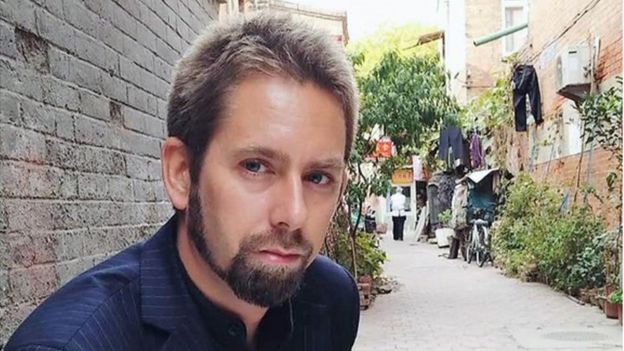
Swedish human rights activist Peter Dahlin is shown in an undated photo. AFP
Swedish human rights worker Peter Dahlin arrived back in his home country on Tuesday after being deported by Beijing in the wake of his detention, although fellow Swedish national Gui Minhai remains in detention in China.
Dahlin was deported rather than facing criminal charges after his detention earlier this month on suspicion of “endangering state security,” for medical and diplomatic reasons, he told journalists.
Dahlin, who founded the Chinese Urgent Action Working Group and who suffers from Addison’s disease, told Swedish radio: “I’m back in Sweden now. I arrived this morning, after various delays but I’m in my hometown now with my parents.”
But he said three of his colleagues at the group and close friends are still in detention, while a spokesman for his group said via Twitter that Dahlin’s Chinese girlfriend was no longer in detention, but remained in China.
After going missing when trying to board a flight to Thailand on Jan. 4 at Beijing’s International Airport, Dahlin was paraded on state-run CCTV after his detention in a “confession” of his alleged crimes, a move that prompted global condemnation of such practices, which are frequently used to subdue Chinese dissidents and rights activists.
Looking dazed and dishevelled, Dahlin apologized to camera for “hurting the feelings of the Chinese people.”
China’s foreign ministry confirmed Dahlin had been deported on Tuesday. “We have deported him,” foreign ministry spokeswoman Hua Chunying told a regular news briefing in Beijing.
Concern about Gui Minhai
Meanwhile, Swedish foreign minister Margot Wallström welcomed the move.
“I welcome the fact that Peter Dahlin can now be reunited with his family in Sweden,” Wallström said in a statement on Dahlin’s release. “This is the result of close contacts between the Swedish foreign ministry and Chinese representatives.”
But Wallström said she remained “greatly concerned” about another Swedish national, Hong Kong-based bookseller Gui Minhai, who went missing in Thailand in October, and who appeared on CCTV “confessing” to killing someone in a drunk-driving accident years ago.
Gui’s family have said they know nothing of any traffic accidents in Gui’s past.
Gui, who the authorities said had “turned himself in” to police, went missing within weeks of four other colleagues linked to Causeway Bay Books, which sells political titles about Communist Party leaders that are banned across the internal border in mainland China.
Chinese activists on Tuesday hit out at Dahlin’s detention, as well as that of dozens of human rights lawyers on subversion charges, some of whom had worked with Dahlin’s group.
Germany-based Sun Yutong said Dahlin was released because he is “a Westerner.”
“They have released one Westerner … but yet they are proceeding with subversion charges against a large group of lawyers back in China, as the persecution continues,” Sun said. “I am very worried about what their fate will be.”
Meanwhile, Beijing-based rights lawyer Li Fangping tweeted: “How can they deport a Swedish national … without any process in a court of law? This has to be decided separately by a court, under Chinese criminal law.”
Amnesty International regional director Nicholas Becquelin said via Twitter that the Dahlin case was designed to focus minds on a forthcoming law mandating police supervision and approval of foreign-funded non-government organizations (NGOs).
“Detention and televised “confession” Swedish NGO worker was designed to set the stage for upcoming law on NGO,” Becquelin wrote. “China has sent the clearest signal yet that it intends to cut domestic NGOs from foreign funding.”
“Amnesty welcomes Peter Dahlin’s release, but it remains that his detention was a clear escalation in the ongoing crackdown on [Chinese] activists,” Becquelin wrote in a series of separate tweets.
‘Shock, awe and prison’
New York University law professor Jerome A. Cohen said Dahlin’s detention and release were timed to create maximum impact.
“The authorities made their point, spreading intimidation and fear throughout both the domestic and foreign legal and NGO worlds,” Cohen wrote on his personal blog on Tuesday.
“Now, having been widely condemned internally as well as externally, they ease the criticism by releasing the accused after what appears to be a reasonable, if secret, bargain,” he said.
He said similar approaches were taken in the case of prominent rights lawyer Pu Zhiqiang and artist Ai Weiwei, but that less well-known activists are unlikely to get the same treatment.
“For them, shock, awe and prison remain the order of the era!” Cohen said.
Last week, the European Union’s ambassador to China Hans Dietmar Schweisgut said the bloc’s members were “deeply concerned” about Dahlin’s detention on suspicion of “endangering state security,” which came after the effective expulsion of French journalist Ursula Gauthier, who had questioned Beijing’s policies in the northwestern region of Xinjiang, home to the mostly Muslim Uyghur ethnic group.
A day later, Paris-based press freedom group Reporters Without Borders (RSF) called on the E.U. to initiate sanctions against state media controlled by the ruling Chinese Communist Party, in the wake of a string of televised “confessions” by detained rights activists and dissidents.
Reported by Yang Fan for RFA’s Mandarin Service, and by Hai Nan for the Cantonese Service. Translated and written in English by Luisetta Mudie.
Source: http://www.rfa.org/english/news/china/china-ngo-01262016122133.html
